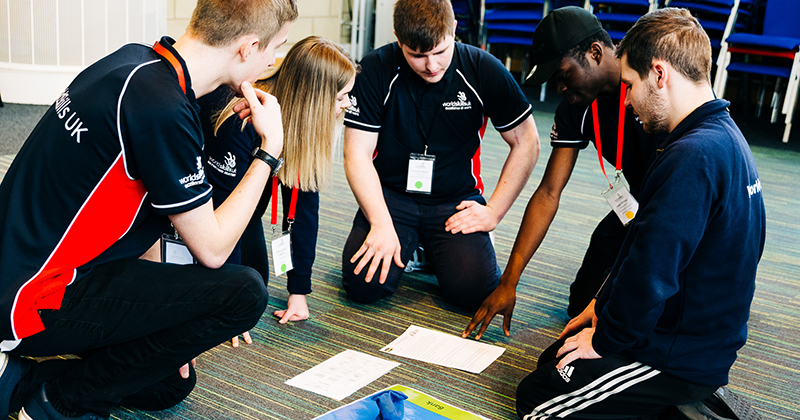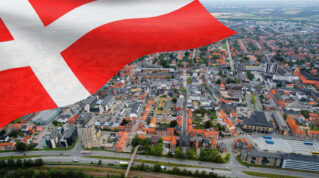FE Week’s senior reporter Will Nott attended a WorldSkills UK bootcamp in Loughborough last Saturday to hear how competitors have been preparing for the 47th WorldSkills competition in Shanghai, despite two years of disruption caused by the pandemic.
The morning kicked off with around 80 skilled young people coming together with their trainers to hear from somebody who had achieved what they all dreamed of.
Haydn Jakes won a gold medal in aircraft maintenance after beating competitors from 75 countries at WorldSkills Kazan 2019.
He stood on a stage and smiled at the audience. “I want you all to take a moment to think about why you want that gold medal,” he told the packed-out room of competitors.
“Because it is a lot easier to get out of bed in the morning to go training if you say to yourself ‘I want this gold medal because of this’. Take that away and think about it throughout your training.”
Keeping up motivation and dealing with added pressure has been a constant battle over the past two years.
The pandemic has caused widespread disruption for those involved in the vocational skills championship. First, WorldSkills Shanghai 2021 was postponed by one year and is now planned to take place this October.
To make things worse, the UK was forced to pull out of the 2021 EuroSkills competition in Graz, Austria, to the disappointment of competitors who had been training hard for the event.
I spoke to Ben Blackledge, WorldSkills UK’s deputy chief executive, who told me the past few years have been “really challenging”.
Normal team selection cycles have been disrupted and hard decisions have had to be made on whether the UK would compete in international events.
“It’s a lot of planning and a lot of resources and time to do that and actually we just thought our focus needed to be on Shanghai,” Blackledge said regarding the missed EuroSkills competition.
“It was a difficult period, especially having to say to these young people ‘you are going’, then ‘you’re not going’. So we didn’t go.”
The impact on competitors who had been training intensely for the event was significant. Abigail Stansfield, who is competing in the CNC milling skill, told me of her excitement when she was first selected to go to Europe and then her disappointment: “It definitely knocked my motivation,” she said.
“Personally, I was high mentally after I was told I could compete for EuroSkills and then after the decision was made that the UK wasn’t going to go, that knocked me so much.
“I was low at that point, but it’s all about working your way back up and getting motivated again.”
Helping competitors with their mental health was a key part of last week’s bootcamp, with a team of sports psychologists being brought in to help them deal with the stress and self-doubt that can result from taking part in high pressure competitions.
The psychologists took the competitors off into groups and asked questions about the mental blocks they were experiencing.
The competitors shared their thoughts and concerns with each other – saying what they thought might stop them from achieving their goals.
These moments, where competitors are able to come together in this way, are precious. Since the UK squad was selected back in 2019, they have only been able to meet once.
This lack of contact is just an added pressure on competitors, who put everything on the line for the competition.
Blackledge told me that WorldSkills UK had seen an increase in the need for additional support around mental health even before the pandemic struck – something that the organisation has been working hard on.
“The closer you get to competition and the closer you are to getting on that plane, the support increases,” he said.
“It’s about avoiding that toxic win-at-all costs mentality. But getting the balance right between ‘this is important’ and ‘this is a big deal’.”
One competitor who feels she has been able to achieve that balance is Mona Nawaz, who is competing in the digital construction skill category. She told me that she has struggled with her mental health but that she feels support has been in place to help her keep going.
“I am lucky enough that I have people that support me. My training manager, my parents, everyone is there. When they notice me going on a little bit of a downfall, they are always there to help me out,” she said.
“It’s about having that support system that has really got me through Covid.”
Trainers play a vital role in preparing competitors for the next stage of selection, and ultimately, if they are successful, Shanghai.
This is particularly true of the past few years, where they have had to think of innovative ways to keep training going despite lockdowns and other restrictions.
In one session during the bootcamp, the trainer’s contributions were acknowledged with certificates being given out for innovation.
One of these trainers was for Sean Owens, UK training manager for culinary arts, who came up with a way to do taste tests remotely using the hedonic taste scale.
“From my experience I do a lot of new product development and I looked at a model that was created around the end of the second world war called the hedonic taste scale,” he told me.
The scale uses nine points to measure food acceptability. Owens, who also works as a food consultant, said that competitors used the scale to rate their own food.
This innovation ultimately enabled competitors to keep doing virtual international pressure tests – a key part of the training process that helps competitors see how they are doing, compared to their international rivals.
Dealing with pressure is the name of the game when it comes to WorldSkills. And so sure enough, the bootcamp finished with more tests. Competitors gathered for a series of tasks that, while fun, would also help them deal with things going wrong in skills tests.
Practice like this could see them get through the next stage of selection or even on to Shanghai.
When I asked Mona Nawaz whether she ever felt that all the pressure was too much she smiled.
“Too much pressure is difficult, but you also need it to be the best you can be,” she said.
After two years of putting up with Covid, as well as getting ready for the “skills Olympics”, they should be fighting fit and ready to bring back gold in October.

















Your thoughts